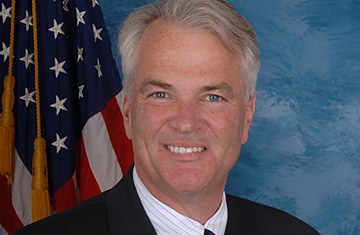
New York Congressman Michael McMahon
Before Congressman Michael McMahon could take the floor at a seniors' bingo tournament at St. Paul's Center on Staten Island, N.Y., Vincent Navarino grabbed the microphone away from him. "I was glad to see you didn't vote for that health care bill," the 79-year-old retired electrician told McMahon, drawing applause from the 60 or so gamers. "I wish it hadn't passed because it's not helping us."
"The decision that we had on health care wasn't easy," the freshman Democratic Representative for the 13th Congressional District of New York told the room. "But it's not important what people say in Manhattan or what people say in Washington. It's important what you guys say, and I'm listening to you."
Staten Island's motto, "Don't dump on me," comes from the fact that its western shore was long dominated by the Fresh Kills landfill, the repository of much of Manhattan's garbage. Culturally, the island nestling at the southern tip of New York state is a world away from New York City's other four boroughs. It has just one-tenth the population density of Manhattan, and its mostly Republican denizens have more in common politically and demographically with the Deep South than with the heavily Democratic and diverse Gotham. In fact, Staten Island tried to secede from New York City in the early 1990s, and most residents still support incorporating their own city.
McMahon says the independence he showed on health care, bucking the party line on reform despite enormous pressure from party leaders, is exactly the kind of spirit that appeals to Staten Islanders. He swept into office with 61% of the vote in 2008, in part because of the Democratic wave that year and in part because of the doings of Vito Fosella, his GOP predecessor. Fosella was forced to resign after news broke that he had a mistress and love child in Virginia. The Cook Political Report rates the district R+4, meaning it leans Republican. And with the GOP expected to make a strong nationwide comeback in congressional races this fall, McMahon — the first Democrat to represent the area in 28 years — is by no means safe. In fact, he needs to draw a healthy number of Republican votes to win re-election, and his voting record up until health care had been 90% in line with House Speaker Nancy Pelosi's. "I voted for him last time, but if he'd voted for this health care boondoggle, I'd have switched to someone else," Joan Grimm, 79, a retired office manager and lifelong Republican, says in between bingo games.
McMahon has taken a lot of heat from the left for his vote against President Obama's top priority. New York City Council Speaker Christine Quinn canceled a fundraiser for him, and the Service Employees International Union withdrew its support and is now actively searching for a Democrat to challenge McMahon in the September primary, as are MoveOn.org and the local progressive Working Families Party. Still, the unions are split on McMahon, who is usually a strong supporter of the labor agenda, and most other local chapters in his district have remained noticeably quiet on his health care vote. Many Democrats fear that the cost of exacting retribution on McMahon may be the loss of his House seat. Congressman Anthony Weiner, a fellow New York Democrat, stepped in to fill Quinn's seat at the fundraiser, showing his support for McMahon, even though Weiner was a strong supporter of health care reform. "Representative Weiner and Representative McMahon came to different conclusions about the health care bill," says Dave Arnold, a Weiner spokesman. "The Congressman expects that there may be other times in Representative McMahon's long career in Congress that they will agree and disagree in the future."
McMahon says he had no option but to vote no. The district has no city hospital — yet another bone of contention with city hall — and the two hospitals that serve it are facing big funding cuts under the legislation. The district is also one of the oldest in the state, and McMahon says that over 40% of his seniors are on Medicare Advantage, a program that will be gutted by the new bill. "My constituents are very happy with [my] vote because they understand and they share my concerns," McMahon says in an interview outside the bingo hall. "I know some people are upset, but I've already begun meeting with the progressive clubs in the district to try and smooth things over."
Besides, for all the health care hullabaloo, constituents have other things to worry about. The first question after McMahon's speech was about the rising cost of living, the next about offshore drilling and the third about the wars in Iraq and Afghanistan. "I'm this way about the health care bill," says Anna Porto, 80, a retired clerk, wagging her index and middle fingers in opposite directions. "I like that it helps the uninsured, but I don't like that we're paying for it. We can't afford it right now — we can't afford anything."
